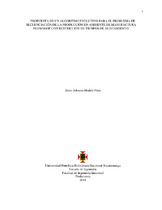| dc.contributor.advisor | González Casallas, Orlando Federico | |
| dc.contributor.author | Madrid Plata, Zaine Johanna | |
| dc.coverage.temporal | 2019 | |
| dc.date.accessioned | 2020-11-06T14:26:26Z | |
| dc.date.available | 2020-11-06T14:26:26Z | |
| dc.date.issued | 2019 | |
| dc.identifier.uri | http://hdl.handle.net/20.500.11912/6312 | |
| dc.description | 114 páginas | spa |
| dc.description.abstract | En la presenten investigación se desarrolla un algoritmo genético para el problema de programación de la secuenciación de la producción tipo Flowshop con restricciones de tiempos de alistamiento, en la celda de manufactura HAS-200 del laboratorio de automatización de la Universidad Pontificia Bolivariana Seccional Bucaramanga, el proyecto abarca tres fases claves, la primera fase de tipo exploratorio se justifica en la revisión teórica y elementos referentes a la secuenciación tipo Flowshop y métodos de resolución, la segunda fase tiene un alcance transeccional, por la caracterización del sistema de producción que integra la celda, para analizar los tiempos estándar de producción del sistema. Finalmente. se hace una validación de la estructura algorítmica por medio de instancias propuestas en la literatura, para determinar la calidad de respuesta y el rendimiento del programa para encontrar la solución al problema de secuenciación; además se evalúa las fuentes de variación de los parámetros del AG con un diseño experimental factorial y se comprueba que el algoritmo propuesto arroja buenos resultados. | spa |
| dc.description.abstract | In the present investigation a genetic algorithm is developed for the programming problem of the sequencing of the production Flowshop type with restrictions of times of enlistment in the cell of manufacture HAS-200 of the automation laboratory of the Universidad Pontificia Bolivariana Seccional Bucaramanga, the project It covers three key phases, the first phase of exploratory type is justified in the theoretical review and elements related to sequencing type Flowshop and resolution methods, the second phase has a transectional scope, by the characterization of the production system that integrates the cell, to analyze the standard production times of the system_ Finally, a validation of the algorithmic structure is done by means of instances proposed in the literature, to determine the quality of response and the performance of the program to find the solution to the problem of sequencing: In addition, the sources of variation of AG parameters are evaluated with a factorial experimental design and it is verified that the proposed algorithm yields good results. | eng |
| dc.format.mimetype | application/pdf | |
| dc.language.iso | spa | |
| dc.publisher | Universidad Pontificia Bolivariana | spa |
| dc.rights | Attribution-NonCommercial-NoDerivatives 4.0 International | * |
| dc.rights.uri | http://creativecommons.org/licenses/by-nc-nd/4.0/ | * |
| dc.subject | Algoritmos genéticos | spa |
| dc.subject | Flowshop | spa |
| dc.subject | Manufacturas | spa |
| dc.subject | Programación (Administración) | spa |
| dc.subject | Tiempo de aislamiento | spa |
| dc.title | Propuesta de un algoritmo evolutivo para problema de secuenciación de la producción en ambiente de manufactura Flowshop con restricción de tiempos de alistamiento | spa |
| dc.type | Trabajo de grado | spa |
| dc.publisher.department | Escuela de Ingenierías | spa |
| dc.publisher.program | Ingeniería Industrial | spa |
| dc.type.hasVersion | publishedVersion | spa |
| dc.description.sectional | Bucaramanga | spa |
| dc.description.degreename | Ingeniero Industrial | spa |


